- Home
- Stephen R. Donaldson
The Wounded Land Page 5
The Wounded Land Read online
Page 5
His voice broke; but he controlled it instantly. “I know all about it. But she didn’t have any defenses. She opened the door for him, and he saw she was the perfect tool, and he’s been using her—using her, when she’s too damaged to even understand what he’s using her for.”
Using her? Linden did not comprehend. He?
Slowly Covenant suppressed his anger. “Of course, her parents didn’t know anything about that. How could they? All they knew was that about six weeks ago she woke them up in the middle of the night and started babbling. She was a prophet, she’d had a vision, the Lord had given her a mission. Woe and retribution to the wicked, death to the sick and the unbelieving. The only sense they could make out of it was that she wanted them to take care of Roger. Then she was gone. They haven’t seen her since.
“After a couple weeks, they called me. I hadn’t seen her—that was the first I’d heard about it. But about two weeks ago she showed up here. Sneaked into my room during the night and tried to tear my face off. If she hadn’t been so weak, she would have succeeded. She must have come all the way on foot.”
He seemed too exhausted himself to go on pacing. His red-rimmed eyes made him look ill, and his hands trembled. How long had he been without decent sleep or peace? Two weeks? When he sat down on the opposite end of the sofa, Linden turned so that she could continue to study him. In the back of her mind, she began trying to conceive some way to give him a sedative.
“Since then,” he sighed, “Berenford and I have been taking care of her. I got him into this because he’s the only doctor I know. He thinks I’m wrong about her, but he’s helping me. Or he was. Until he got you into this.” He was too tired to sound bitter. “I’m trying to reach her any way I can, and he’s giving her drugs that are supposed to clear her mind. Or at least calm her so I can feed her. I leave the lights on in there all the time. Something happens to her when she’s alone in the dark. She goes berserk—I’m afraid she’ll break an arm or something.”
He fell silent. Apparently he had reached the end of his story— or of his strength. Linden felt that his explanation was incomplete, but she held her questions in abeyance. He needed aid, a relief from strain. Carefully she said, “Maybe she really should be in a hospital. I’m sure Dr. Berenford’s doing what he can. But there are all kinds of diagnostic procedures he can’t use here. If she were in a hospital—”
“If she were in a hospital”—he swung toward her so roughly that she recoiled—“they’d keep her in a straitjacket, and force-feed her three times a day, and turn her brain into jelly with electroshock, and fill her up with drugs until she couldn’t recognize her own name if God Himself were calling for her, and it wouldn’t do any good! Goddamn it, she was my wife!” He brandished his right fist. “I’m still wearing the bloody ring!”
“Is that what you think doctors do?” She was suddenly livid; her failure made her defensive. “Brutalize sick people?”
He strove to contain his ire. “Doctors try to cure problems whether they understand them or not. It doesn’t always work. This isn’t something a doctor can cure.”
“Is that a fact?” She did not want to taunt him; but her own compulsions drove her. “Tell me what good you’re doing her.”
He flinched. Rage and pain struggled in him; but he fought them down. Then he said simply, “She came to me.”
“She didn’t know what she was doing.”
“But I do,” His grimness defied her. “I understand it well enough. I’m the only one who can help her.”
Frustration boiled up in her. “Understand what?”
He jerked to his feet. He was a figure of passion, held erect and potent in spite of weakness by the intensity of his heart. His eyes were chisels; when he spoke, each word fell distinctly, like a chip of granite.
“She is possessed.”
Linden blinked at him. “Possessed?” He had staggered her. He did not seem to be talking a language she could comprehend. This was the twentieth century; medical science had not taken possession seriously for at least a hundred years. She was on her feet. “Are you out of your mind?”
She expected him to retreat. But he still had resources she had not plumbed. He held her glare, and his visage—charged and purified by some kind of sustaining conviction—made her acutely aware of her own moral poverty. When he looked away, he did not do so because he was abashed or beaten; he looked away in order to spare her the implications of his knowledge.
“You see?” he murmured. “It’s a question of experience. You’re just not equipped to understand.”
“By God!” she fumed defensively, “that’s the most arrogant thing I’ve ever heard. You stand there spouting the most egregious nonsense, and when I question you, you just naturally assume there must be something wrong with me. Where do you get the gall to—?”
“Dr. Avery.” His voice was low, dangerous. “I didn’t say there was anything wrong with you.”
She did not listen to him. “You’re suffering from classic paranoia, Mr. Covenant.” She bit each word mordantly. “You think that everybody who doubts you isn’t quite right in the head. You’re a textbook case.”
Seething irrationally, she turned on her heel, stamped toward the door—fleeing from him, and fighting furiously to believe that she was not fleeing. But he came after her, caught hold of her shoulders. She whirled on him as if he had assaulted her.
He had not. His hands dropped to his sides, and twitched as if they ached to make gestures of supplication. His face was open and vulnerable; she saw intuitively that at that moment she could have asked him anything, and he would have done his best to answer. “Please,” he breathed. “You’re in an impossible situation, and I haven’t made it any easier. But please. At least consider the chance that I know what I’m doing.”
A retort coiled in her mouth, then frayed and fell apart. She was furious, not because she had any right to be, but because his attitude showed her how far she had fallen into the wrong. She swallowed to stifle a groan, almost reached out toward him to apologize. But he deserved something better than an apology. Carefully she said, “I’ll consider it.” She could not meet his eyes. “I won’t do anything until I talk to you again.”
Then she left the house, frankly escaping from the exigency of his incomprehensible convictions. Her hands fumbled like traitors as she opened the door of her car, slid behind the wheel.
With failure in her mouth like the taste of sickness, she drove back to her apartment.
She needed to be comforted; but there was no comfort in those grubby walls, in the chipped and peeling floorboards which moaned like victims under her feet. She had accepted that apartment precisely because it offered her no comfort; but the woman who had made that decision was a woman who had never watched herself buckle under the demands of her profession. Now for the first time since that moment of murder fifteen years ago, when her hands had accepted the burden of blood, she yearned for solace. She lived in a world where there was no solace.
Because she could think of no other recourse, she went to bed.
Tension and muggy sheets kept her awake for a long time; and when she finally slept, her dreams were sweat and fear in the hot night. The old man, Covenant, Joan—all babbled of He, trying to warn her. He who possessed Joan for purposes too cruel to be answered. He who intended to harm them all. But at last she sank into a deeper slumber, and the evil went back into hiding.
She was awakened by a knocking at her door.
Her head felt swollen with nightmares, and the knocking had a tentative sound, as if the knocker believed the apartment to be dangerous. But it was imperative. She was a doctor.
When she unclosed her eyes, the light of midmorning pierced her brain.
Groaning she climbed out of bed, shrugged her arms into a bathrobe, then went to open the door.
A short timid woman with hands that fluttered and eyes that shied stood on the landing. Timorously, she asked, “Dr. Avery? Dr. Linden Avery?”
With an e
ffort, Linden cleared her throat. “Yes.”
“Dr. Berenford called.” The woman seemed to have no idea what she was saying. “I’m his secretary. You don’t have a phone. I don’t work on Saturdays, but he called me at home. He wants you to meet him. He’s supposed to be on rounds.”
“Meet him?” A pang of apprehension went through her. “Where?”
“He said you’d know where.” Insistently the woman went on, “I’m his secretary. I don’t work on Saturdays, but I’m always glad to help him. He’s a fine man—a fine doctor. His wife had polio. He really should be on rounds.”
Linden shut her eyes. If she could have summoned any strength, she would have cried out, Why are you doing this to me? But she felt drained by bad dreams and doubt. Muttering, “Thank you,” she closed the door.
For a moment, she did not move; she leaned against the door as if to hold it shut, wanting to scream. But Dr. Berenford would not have gone to such trouble to send for her if the situation were not urgent. She had to go.
As she dressed in the clothes she had worn the previous day and ran a comb through her hair, she realized that she made a choice. Sometime during the night, she had given her allegiance to Covenant. She did not understand what was wrong with Joan, or what he thought he could do about it; but she was attracted to him. The same intransigence which had so infuriated her had also touched her deeply; she was vulnerable to the strange appeal of his anger, his extremity, his paradoxically savage and compassionate determination to stand loyal to his ex-wife.
She drank a quick glass of orange juice to clear her head, then went down to her car.
The day was already unnaturally hot; the sunlight hurt her eyes. She felt oddly giddy and detached, as if she were experiencing a hallucination, as she entered the dirt roadway and approached Covenant’s house. At first, she was not sure of her vision when she descried the dark stain on the wall.
She parked beside Dr. Berenford’s car, jumped out to look.
Near the doorway, a tall, crude triangle violated the white wall. It was reddish-black, the color of dried blood. The vehemence of its intent convinced her that it was blood.
She began to run.
Springing into the living room, she saw that it, too, had been desecrated. All the furnishings were intact; but everything was splotched and soaked with blood. Buckets of blood had been thrown into the room. A sickly-sweet smell clogged the air.
On the floor near the coffee table lay a shotgun.
Her stomach writhed. She slapped her hands to her mouth to keep herself from crying out. All this blood could not have come from one ordinary human body. Some atrocity—
Then she saw Dr. Berenford. He sat in the kitchen at the table, with a cup between his hands. He was looking at her.
She strode toward him, started to demand, “What the hell—?”
He stopped her with a warning gesture. “Keep it down,” he said softly. “He’s sleeping.”
For a moment, she gaped at the Chief of Staff. But she was accustomed to emergencies; her self-command quickly reasserted itself. Moving as if to prove to him that she could be calm, she found a cup, poured herself some coffee from the pot on the stove, sat down in the other chair at the old enamel-topped table. In a flat tone, she asked, “What happened?”
He sipped his own coffee. All the humor was gone out of him, and his hands shook. “I guess he was right all along.” He did not meet her stare. “She’s gone.”
“Gone?” For an instant, her control slipped. Gone? She could hardly breathe past the thudding of her heart. “Is anybody looking for her?”
“The police,” he replied. “Mrs. Roman—did I tell you about her? She’s his lawyer. She went back to town after I got here—a couple hours ago. To light a fire under the Sheriff. Right now, every able-bodied cop in the county is probably out looking. The only reason you don’t see cars is because our Sheriff—bless his warm little heart—won’t let his men park this close to a leper.”
“All right.” Linden mustered her training, gripped it in both hands. “Tell me what happened.”
He made a gesture of helplessness. “I don’t really know. I only know what he told Mrs. Roman—what he told me. It doesn’t make any sense.” He sighed. “Well, this is what he says. Sometime after midnight, he heard people at his door. He’d spent most of the evening trying to bathe her, but after that he fell asleep. He didn’t wake up until these people began acting like they wanted to tear the door down.
“He didn’t have to ask them what they wanted. I guess he’s been expecting something like this ever since Joan showed up. He went and got his shotgun—did you know he had a shotgun? Had Mrs. Roman buy it for him last week. For self-defense—as if being a leper wasn’t more defense than he ever had any use for.” Seeing Linden’s impatience, he went back to his story. “Anyway, he got his gun, and turned on all the lights. Then he opened the door.
“They came in—maybe half a dozen of them. He says they wore sackcloth and ashes.” Dr. Berenford grimaced. “If he recognized any of them, he won’t admit it. He waved the shotgun at them and told them they couldn’t have her.
“But they acted as if they wanted to be shot. And when it came right down to it, he couldn’t. Not even to save his ex-wife.” He shook his head. “He tried to fight them off by main strength, but one against six, he didn’t have much chance.
“Sometime early this morning, he came to long enough to call Mrs. Roman. He was incoherent—kept telling her to start a search, only he couldn’t explain why—but at least he had sense enough to know he needed help. Then he passed out again. When she got here, she found him unconscious on the floor. There was blood everywhere. Whoever they were, they must have bled an entire cow.” He gulped coffee as if it were an antidote for the reek in the air. “Well, she got him on his feet, and he took her to check on Joan. She was gone. Restraints had been cut.”
“They didn’t kill her?” interjected Linden.
He glanced at her. “He says no. How he knows—your guess is as good as mine.” After a moment, he resumed, “Anyway, Mrs. Roman called me. When I got here, she left to see what she could do about finding Joan. I’ve examined him, and he seems to be all right. Suffering from exhaustion as much as anything else.”
Linden shrugged aside her doubts about Covenant’s condition. “I’ll watch him.”
He nodded. “That was why I called for you.”
She drank some of her coffee to steady herself, then inquired carefully, “Do you know who they were?”
“I asked him that,” Dr. Berenford replied with a frown. “He said, ‘How the hell should I know?’ ”
“Well, then, what do they want with her?”
He thought for a moment, then said, “You know, the worst part about the whole thing is—I think he knows.”
Frustration made her querulous. “So why won’t he tell us?”
“Hard to say,” said the doctor slowly. “I think he thinks if we knew what was going on we’d try to stop him.”
Linden did not respond. She was no longer prepared to try to prevent Thomas Covenant from doing anything. But she was equally determined to learn the truth about Joan, about him—and, yes, about the old man in the ochre robe. For her own sake. And for Covenant’s. In spite of his fierce independence, she could not shake the conviction that he was desperately in need of help.
“Which is another reason for you to stay,” the older man muttered as he rose to his feet. “I’ve got to go. But somebody has to prevent him from doing anything crazy. Some days—” His voice trailed away, then came back in sudden vexation. “My God, some days I think that man needs a keeper, not a doctor.” For the first time since her arrival, he faced her squarely. “Will you keep him?”
She could see he wanted reassurance that she shared his sense of responsibility for Covenant and Joan. She could not make such a promise. But she could offer him something similar. “Well, at any rate,” she said severely, “I won’t let go of him.”
He nodded vag
uely. He was no longer looking at her. As he moved toward the door, he murmured, “Be patient with him. It’s been so long since he met somebody who isn’t afraid of him, he doesn’t know what to do about it. When he wakes up, make him eat something.” Then he left the house, went out to his car.
Linden watched until he disappeared in dust toward the highway. Then she turned back to the living room.
What to do about it? Like Covenant, she did not know. But she meant to find out. The smell of blood made her feel unclean; but she suppressed the sensation long enough to fix a breakfast for herself. Then she tackled the living room.
With a scrub brush and a bucket of soapy water, she attacked the stains as if they were an affront to her. Deep within her, where her guilt and coercion had their roots, she felt that blood was life—a thing of value, too precious to be squandered and denied, as her parents had squandered and denied it. Grimly she scrubbed at the madness or malice which had violated this room, trying to eradicate it.
Whenever she needed a break, she went quietly to look at Covenant. His bruises gave his face a misshapen look. His sleep seemed agitated, but he showed no sign of drifting into coma. Occasionally, the movements of his eyes betrayed that he was dreaming. He slept with his mouth open like a silent cry; and once his cheeks were wet with tears. Her heart went out to him as he lay stretched there, disconsolate and vulnerable. He had so little respect for his own mortality.
Shortly after noon, while she was still at work, he came out of his bedroom. He moved groggily, his gait blurred with sleep. He peered at her across the room as if he were summoning anger; but his voice held nothing except resignation. “You can’t help her now. You might as well go home.”
She stood up to face him. “I want to help you.”
“I can handle it.”
Linden swallowed bile, tried not to sound acerbic. “Somehow you don’t look that tough. You couldn’t stop them from taking her. How are you going to make them give her back?”
His eyes widened; her guess had struck home. But he did not waver. He seemed almost inhumanly calm—or doomed. “They don’t want her. She’s just a way for them to get at me.”

 The Illearth War
The Illearth War Last Chronicles of Thomas Covenant 02 - Fatal Revenant
Last Chronicles of Thomas Covenant 02 - Fatal Revenant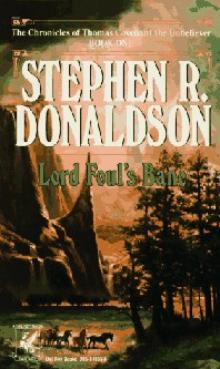 Lord Foul's Bane
Lord Foul's Bane The Gap Into Ruin: This Day All Gods Die
The Gap Into Ruin: This Day All Gods Die White Gold Wielder
White Gold Wielder Fatal Revenant
Fatal Revenant The Mirror of Her Dreams
The Mirror of Her Dreams Against All Things Ending
Against All Things Ending The Real Story: The Gap Into Conflict
The Real Story: The Gap Into Conflict The Power That Preserves
The Power That Preserves Seventh Decimate
Seventh Decimate The Gap Into Power: A Dark and Hungry God Arises
The Gap Into Power: A Dark and Hungry God Arises A Man Rides Through
A Man Rides Through The Gap Into Vision: Forbidden Knowledge
The Gap Into Vision: Forbidden Knowledge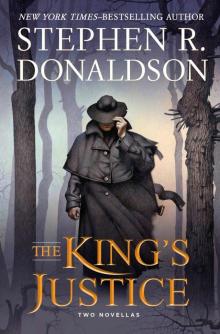 The King's Justice: Two Novellas
The King's Justice: Two Novellas The Wounded Land
The Wounded Land The Runes of the Earth
The Runes of the Earth Mordant's Need
Mordant's Need The One Tree
The One Tree Gilden-Fire
Gilden-Fire Reave the Just and Other Tales
Reave the Just and Other Tales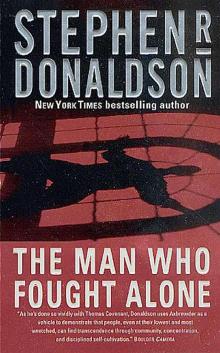 The Man Who Fought Alone
The Man Who Fought Alone The Last Dark
The Last Dark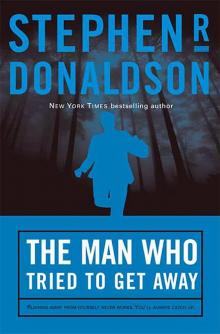 The Man Who Tried to Get Away
The Man Who Tried to Get Away Thomas Covenant 02: The Illearth War
Thomas Covenant 02: The Illearth War A Dark and Hungry God Arises
A Dark and Hungry God Arises The One Tree t2cotc-2
The One Tree t2cotc-2 Lord Foul's Bane cotc-1
Lord Foul's Bane cotc-1 The Illearth War t1cotc-2
The Illearth War t1cotc-2 The Runes of the Earth: The Last Chronicles of Thomas Covenant - Book One
The Runes of the Earth: The Last Chronicles of Thomas Covenant - Book One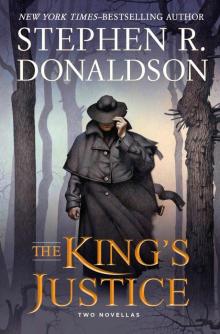 The King's Justice
The King's Justice White Gold Wielder t2cotc-3
White Gold Wielder t2cotc-3 The Power That Preserves t1cotc-3
The Power That Preserves t1cotc-3 Thomas Covenant 01: Lord Foul's Bane
Thomas Covenant 01: Lord Foul's Bane Chaos and Order: The Gap Into Madness
Chaos and Order: The Gap Into Madness Daughter of Regals
Daughter of Regals Forbidden Knowledge: The Gap Into Vision
Forbidden Knowledge: The Gap Into Vision Fatal Revenant t3cotc-2
Fatal Revenant t3cotc-2 The Runes of the Earth t3cotc-1
The Runes of the Earth t3cotc-1 Thomas Covenant 03: Power That Preserves
Thomas Covenant 03: Power That Preserves This Day all Gods Die: The Gap into Ruin
This Day all Gods Die: The Gap into Ruin The Wounded Land t2cotc-1
The Wounded Land t2cotc-1 This Day All Gods Die
This Day All Gods Die One Tree
One Tree